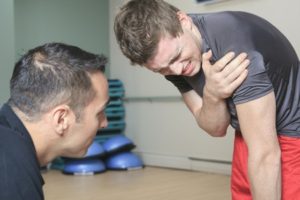Frozen Shoulder and Shoulder Injuries
 Frozen shoulder treatment
Frozen shoulder treatment
Dr. Jason Taylor is extremely experienced and trained in the diagnosis and successful rehabilitation of shoulder injuries. In fact, Dr. Taylor went through advanced training to be certified in Manipulation Under Anesthesia which has been found to be extremely successful in treating specific shoulder conditions and has been used by Orthopaedic doctors for over 70 years to treat this condition.
Frozen shoulder or adhesive capsulitis
Frozen shoulder or ‘adhesive capsulitis’ affects shoulder joint mobility with stiffness and pain and occurs usually between the ages of 40 and 60. If left untreated, recovery is slow and symptoms can last for two to three years. If treatment is started early, frozen shoulder can be successfully cured in a few weeks with regular manipulation mobilization and deep massage.
Subacromial impingement
The tendons of the rotator cuff pass beneath the acromion of the shoulder. Overuse may cause inflammation of the tendons and their protective bursa and a narrowed sub acromion space within the shoulder can produce tendon pinching or compression with pain on raising the arm.
Rotator cuff
The rotator cuff tendon may tear or become chronically inflamed from falls or repetitive strain resulting in weakness and shoulder pain on internal or external rotation relating to back and neck pain.
Shoulder dislocation
The shoulder is a ball and socket joint and is the easiest to dislocate of any joint in the body. This is due to the socket (glenoid) being very shallow compared with the diameter of the ball. The stability of the shoulder is aided by a series of ligaments, a thick rim of tissue that deepens the socket called the labrum and a strong but flexible capsule which surrounds and contains the entire shoulder joint.
If the ligaments or the capsule stretch or the labrum is torn off the socket then the joint may partially or fully dislocate.
 Shoulder and acromioclavicular joint (AC Joint) dislocation.
Shoulder and acromioclavicular joint (AC Joint) dislocation.
Damage of the shoulder is relatively common with falls, sports or road traffic accidents.
Sayer Clinics’ chiropractors, osteopaths and physical therapists are extremely experienced in the diagnosis and rehabilitation of shoulder conditions.
Rotator cuff tendinitis or shoulder trauma often produce pain and stifness in surrounding muscles including deltoid, pectoral, supraspinatus, infraspinatus, trapezius and rhomboids and intercostal muscles.
Treatment
Treatment typically consists of gentle and very specific joint manipulation and mobilization and massage, cold laser or acupuncture to encourage blood flow, restore mobility and healing.
Here is more information regarding manipulation under anesthesia:
is a multidisciplinary, chronic pain-related manual therapy modality which is used for the purpose of improving articular and soft tissue movement. This is accomplished by way of a combination of controlled joint mobilization/manipulation and myofascial release techniques. In any form, MUA is used by osteopathic/orthopedic physicians and specially trained (MUA certified) chiropractors. It is intended as a means of breaking up adhesions (scar tissue) of or about spinal joints (cervical, thoracic, lumbar, sacral, or pelvic regions), or extremity joint articulations (i.e., knee, shoulder, hip) to which painfully restricted range of motion significantly limits function. Failed attempts at other standard conservative treatment methods (i.e., manipulation, physical therapy, medication), over a sufficient time-frame, is one of the principal patient qualifiers.
Voted Top 3 Chiropractors in Gilbert
Free Consultation
(480) 633-3399
 Our Location:
Our Location:
690 East Warner Road, Suite 113
Gilbert, AZ 85296
Phone: (480) 633-3399
CLINIC DETAILS
Gilbert Chiropractor
Hours:
- Mon: 09:00AM – 1:00 PM 3PM – 07:00PM
- Tue: 09:00AM – 1:00PM 3PM – 07:00PM
- Wed: 09:00AM – 1:00PM 3PM – 07:00PM
- Thu: 09:00AM – 1:00PM 3PM – 07:00PM
- Fri: 09:00AM – 12:00PM Admin Hours Only
- Sat – Sun: Closed
What Others are Saying


